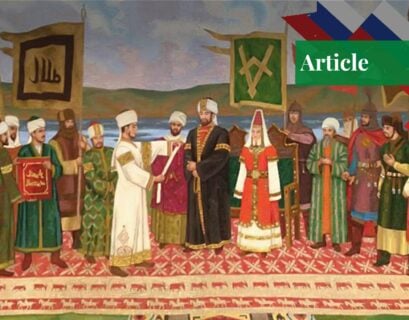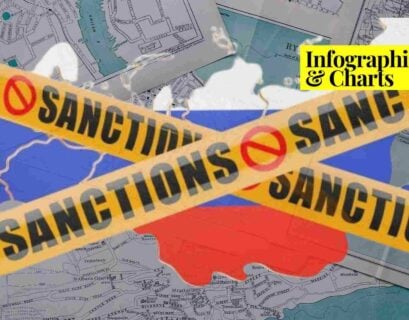Hafsa Ammar is a graduate of the National Defence University, Islamabad. Her areas of expertise are narrative building and propaganda warfare, centered around the Soviet Union and modern-day Russia.
The Beginning
For us in Russia, communism is a dead dog, while, for many people in the West, it is still a living lion. – Aleksandr Solzhenitsyn
Derived from the Latin word ‘Communism,’ meaning common or universal, Communism is a political system or form of government that depends upon the abolishment of classism and private property. It essentially talks about state structuring – the government is usually authoritarian or totalitarian and is in full control of the means of production and wealth, which it distributes to all in accordance with their needs.
Communism was first theorized by Karl Marx and Frederick Engels in the first half of the 19th century, specifically in 1848. It gained significant recognition in 1917 when Lenin led the ‘Great October Socialist Revolution’ and formed the first communist government in the USSR. From there, it just gathered momentum and it was soon prevalent all-over East Asia.
The reason for such popularity in the region was due to the job demographics alongside population blooms. Although China, India, and Russia, among others, are at varying levels of development, they have massive populations and are often famous for their major export of human labor.
The Communist Revolution
Manual labor in developed states is most often made up of Bengali, Pakistani, and Nepalese nationalities; now if we are to correlate the popularity of communism with the masses, we are sure to look at the people who are benefiting from such a political ideology. It is definitely not the elites, which goes to show why the developed states were mostly against it.
The main reason for the communist revolution in China was because of Mao Zedong who was probably to date the most famous leader of the peasant revolts of that time. Political scientists argue to this day that China evolved truly after it developed its free-market economy; however, we all know that China’s success lies in its working class.
Securitization of Communism
Securitization refers to people of power building a narrative through powerful discourse. It can refer to any political issue that is deemed and declared a matter of national interest, security, and perusal by the authorities. Communism suffered the same fate, a political theory which suggests alterations for the structure and duties of state government was panned out as the new calamity, only one with a strong-armed solution that the United States were all too well established to handle.
The securitization of communism is what kept the cogs of the Cold War turning. The ‘Red Scare’ was the concept used by the West to pursue its political motivations and spread its influence all over the globe. It touched upon and threatened four key facets of security: politics, economy, military, and society.
However, the point of note is that it was American Presidents, military advisers, policymakers, and narrative builders themselves who built up the communist threat to the heights of an impending nuclear war. They portrayed themselves as the security guarantees that the rest of the world allegedly needed from this political plague.
Securitization is done through various avenues such as laws, speeches, public letters, etcetera. It is also tied to constructivism. Constructivism, developed mainly by Piaget and Vygotsky, talks to the creation of norms by agents (people, institutions, organizations) when they exercise their agency/free will. This theory clarifies how the securitization of communism truly became global.
The international structure split in half as the superpowers of the time started posturing as opponents and became poised to deter and, if worse came to worst, threaten war. Shifting of polarity became imminent in the international system due to the harsh divides created by the discourse over communism. As discourse is the fusion of authority and power, this claim is best supported through dialogues of leaders and revolutionists of that time.
US Presidents & their Approaches
A total of 9 American Presidents came into power during the Cold War and they each had their own specific approach to dealing with the persistent threat of communism. As we’re studying securitization and the display of communism as a threat, therefore, studying doctrines and dialogues of the West is of utmost importance.
President Harry S. Truman, the 33rd President, served the United States of America from 1945 till 1953. He brought forth the Truman Doctrine, a policy of the American government to provide aid and backing to the states susceptible to Soviet overpowering. He promised the world (as the leader of the global superpower) his government’s unyielding commitment to helping avoid and contain the communist strain.
The doctrine was first presented in 1947 and was seen then and forevermore as the initiation of the Cold War. Later, John F. Kennedy was quoted saying, “All problems are dwarfed by the necessity of the West to maintain against the Communists a balance of power.” The way Kennedy delivered his ideas to his state raised alarm in the eyes of discourse analysts.
‘The West’ refers to not just the American superpower but Europe as well, deeming communism a threat of the highest priority to the strongest and most developed states painted it as something vast, inexplicable, and horrific to the common man.
Next on the list of proactive presidents is Ronald Reagan who portrayed America as the sole pursuer of peace in an anarchic system falling prey to communism, “It was leadership here at home that gave us strong American influence abroad, and the collapse of imperial Communism. Great nations have responsibilities to lead.” He gave America a hero’s praise, “America is the moral force that defeated communism and all those who would put the human soul itself into bondage.”
President Dwight Eisenhower had a little more militarily inclined approach to the issue and thought that a state must be willing to go to war to do what’s right and protect its interests, no matter the cost. He was the one who coined the concept of brinksmanship through his ideals. He brought forth the Eisenhower doctrine.
His doctrine focused on securing the Middle East under capitalism and essentially away from communism and the Soviet influence, the document talked about providing aid to Middle Eastern states that were or would in the future face Soviet aggression and communist strain. Just the Communist Control Act of 1954 goes to show how severely and across all avenues America banned this political ideology.
President Richard Nixon had a slightly different approach towards the conflict. He only saw and addressed communism as a threat to be exterminated and thought it fitting to go at the conflict with peaceful and conciliatory gestures and initiated the second phase of the Cold War i.e., the détente.
President Lyndon B. Johnson brought back the traditional policies of containment and did not care much for negotiation or compromises. He was very concerned in regard to his reputation and did not want to be perceived forevermore as the president who let Vietnam fall to the communists as he believed that Vietnam was the only thing that kept communism from spreading into Southeast Asia, therefore he was the one who was ambitious and headstrong enough to have the Western superpower fight a proxy war against USSR in Vietnam.
Up next was President Jimmy Carter who used the empathy card to gain votes and win the election. Here we see how constructivism and securitization happened in plain sight but are also nearly impossible to visualize at said moments. President Carter focused a lot on humanitarian causes in his election campaigns as he knew that the citizens of the United States were tired and exhausted from bearing the brunt of the Cold War.
Jimmy Carter succeeded in not only getting elected over humanitarian grounds and causes, but he also still maintained the discourse of the communist threat. Now to the common man, correlation is a subconscious act, therefore, the masses connected President Carter, a person who had won his elections by campaigning for human rights and advocacy, to ideals of loyalty honesty, truth, and safety.
His word was accepted without a speck of distrust, for in their minds, how can a person who wants welfare and protection for all, lie about communism being a threat? Bush focused a bit more on the diplomatic side of affairs as he tried to maintain and strengthen ties with the Russian Federation after the collapse of the Soviet Empire.
Conclusion
All the presidents came forward with not only an agenda to preserve and protect national interests, but they also had an ulterior motive of an expansionist nature. It is only through securitization of the political ideology of communism that they could build a threat big enough and then use it to collapse the Eastern bloc and reign as one supreme hegemon.
Communism did not pose as big a threat as shown or declared by the West because after they had achieved their main goal of removing or more accurately shattering the opposition, the USSR, they all of a sudden had no more qualms with socialist states so to say. Even to this day, Cuba, China, and Russia seem ultimately better off if seen from a people-centric lens which is what a state should aim for.
American policymakers and government officials often claim that China gained success and prosperity after it embraced the free-market economy, a major component of capitalism, to cement its statement of not going to war against the Asian giant. On the other hand, we see them reshuffling the cards of securitization once again, only this time it is against China as an economic rival — hence the Sino-US trade war — rather than as an ideological one that the Soviet Empire represented.
If you want to submit your articles, research papers, and book reviews, please check the Submissions page.
The views and opinions expressed in this article/paper are the author’s own and do not necessarily reflect the editorial position of Paradigm Shift.


















